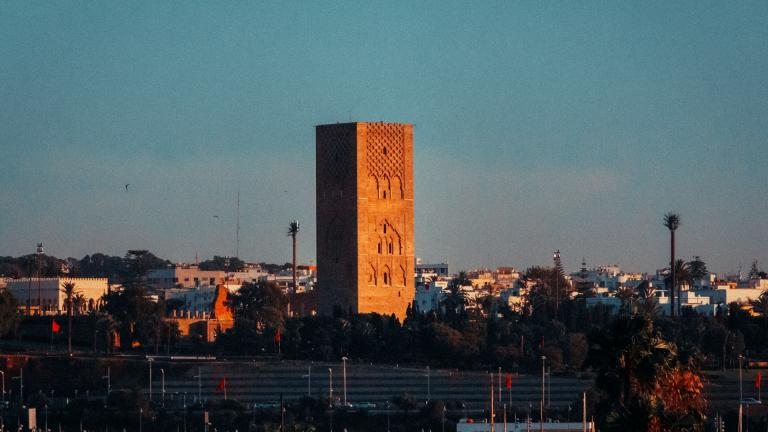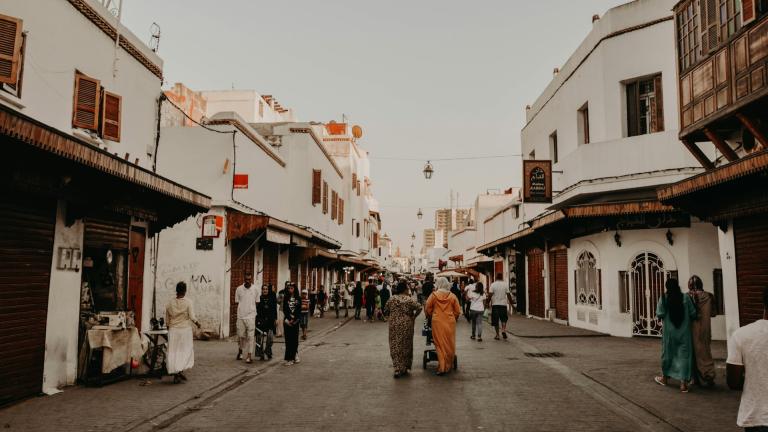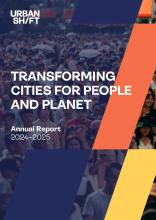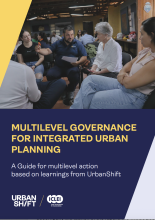Recap
Local Leadership Paves the Way for Sustainable Change in Morocco
How can Morocco transform its resources, waste, and energy into engines of resilient growth?
This blog was written by Saheel Ahmed and Karishma Asarpota from ICLEI.
How can Morocco transform its resources, waste, and energy into engines of resilient growth? That was the central question at the UrbanShift Morocco Multilevel Governance Dialogue, held on 20 June 2025 in Rabat. Bringing together more than 100 leaders from national and local governments, international agencies, industry, academia, and civil society, the event represented a founding step into Morocco’s ambitious journey toward a circular economy rooted in innovation, inclusion, and action.
Ideas turning into action via thematic workshops
The Dialogue featured three action-oriented workshops, each focused on translating vision into tangible steps:
- Waste: Plans surfaced for formalizing informal recyclers, strengthening extended producer responsibility (EPR), and improving segregation at the source.
- Water: Conversations centered on wastewater reuse, decentralized systems, and reformed tariffs to drive efficiency.
- Energy and resources: Focused on harnessing waste, biomass, and alternative energies, alongside circular supply chains and products designed for longevity.
“The circular economy is not only an environmental imperative, it is an opportunity for inclusive and sustainable economic transformation.”
With that statement, Minister Leila Benali (Ministry of Energy Transition and Sustainable Development) opened the discussion, urging Morocco’s diverse stakeholders to move beyond conversation and toward tangible strategies.
Joining her were Ilaria Carnevali (UNDP Morocco) and Sanae Lahlou (UNIDO Morocco), both confirming that international technical support and knowledge-sharing will be key pillars in advancing Morocco’s path forward. Paul Currie (ICLEI Africa), framed circularity as an opportunity to “rethink how resources are used, shared, and valued,” stressing that true change requires systemic innovation.
From global learning to local action
During the session on global best practices, Claire Thiebault (UNEP) shared principles of waste reduction, material reuse, and ecosystem restoration, emphasizing that Morocco should align themselves with the global trajectories to ensure that national strategies are compatible with global standards. Gaetan Ducroux (EU Delegation) offered Europe's journey as a guide, noting the value of strong regulation and pilot-driven innovation emphasizing regulatory frameworks (like the EU Circular Economy Action Plan), financial incentives, and strong monitoring systems.Locally, Hafsa Lakhlifi (Ministry of Energy Transition and Sustainable Development – Director of Circular Economy and Pollution Control) underscored that while frameworks are in place, the challenge lies in scaling these efforts and embedding circularity across all levels of governance.She noted the need for stronger inter-ministerial coordination, scaling up pilot projects, and better alignment between local and national actions.
Diverse Voices, Shared Priorities
The strategic panel revealed the unity within diversity:
-
Rabiaa Janati (Ministry of Industry and Trade) emphasized how sustainability and circularity are increasingly tied to industrial competitiveness. She argued that Morocco’s industries cannot remain competitive without integrating circular approaches, particularly by adopting circular business models that prioritize resource efficiency, closed loops, and innovative industrial practices. Importantly, she pointed to the need to scale up existing industrial pilots, many of which remain small in scope—so that they become transformative at the national level.
-
Mohamed El Houari (AMEE – Moroccan Agency for Energy Efficiency) explored the synergy between renewable energy, energy efficiency, and circular economy principles. He underscored opportunities to valorize energy flows, such as through waste-to-energy and biomass projects, which can simultaneously reduce waste and generate clean energy.
-
Hanane Mourchid (OCP – Office Chérifien des Phosphates) placed innovation and investment at the heart of Morocco’s transformation. She noted that OCP has already integrated circular practices internally, but stressed that “strategic investments and long-term innovation are non-negotiable” for any industry aiming to achieve resource efficiency. She framed circularity as a business imperative requiring bold, sustained investment.
-
Hind Baddag (from the cement sector) highlighted current practices in waste valorization and energy substitution within the construction sector. She focused on two key opportunities: (1) Reusing demolition waste in new construction processes. And (2) pivoting to alternative fuels—such as biomass or waste-derived fuels—rather than relying exclusively on traditional fossil fuels.
-
Mounsif Chrai (COVAD – Coalition for Waste Valorization) stressed that while recycling has strong potential, Morocco faces barriers of infrastructure, regulation, and market readiness. He called for clearer frameworks and coordination mechanisms to unlock this potential, pointing to the need to formalize and structure recycling value chains. He framed recycling not only as a technical issue but as a systemic challenge requiring governance clarity.
-
Oussama Hasnaoui (AIRE – Alliance for Innovation and Recycling in Packaging) pressed for greater producer responsibility in designing circular systems. He specifically advocated for Extended Producer Responsibility (EPR) schemes, where companies take accountability for the lifecycle of their products and packaging. He also pointed to the importance of logistics and traceability improvements in packaging recovery, noting that without efficient systems, recycling efforts cannot scale. His intervention called for public–private collaboration to secure investment and build efficient packaging recovery systems.
-
From civil society, Abderrahim Ksiri (Association of Life and Earth Science Teachers AESVT, Civil Society and Governance (CESE)) pointed out systemic challenges highlighting persistent structural barriers to Morocco’s circular transition. He flagged data gaps, fragmented governance, and lack of coordination as systemic challenges that undermine progress. His message was clear: unless these foundational governance issues are addressed, sectoral efforts will remain piecemeal. He also suggested that circularity must be mainstreamed into territorial governance and national planning, making it part of the systemic architecture rather than a series of isolated initiatives.
What comes next
The Dialogue’s findings will feed directly into Morocco’s circular economy roadmap currently being developed by the Ministry of Energy Transition and Sustainable Development (MTEDD), with a follow-up national-level dialogue scheduled for September. This second National Dialogue aims to explore how circular economy principles can be localized within cities. The gathering will also offer stakeholders an opportunity to examine how the recommendations from the first National-Local Dialogue have been integrated, advance technical planning, and strengthen the alignment between national policy and local implementation.

Second National-Local Dialogue for Morocco: From Vision to Local Action, Advancing the Circular Economy
Building on the first National-Local Dialogue, this convening offered an opportunity to deepen discussions around localizing circular economy principles across the country.

First National-Local Dialogue for Morocco
To accelerate the circular economy transition in Morocco, UrbanShift and ICLEI will gather representatives from all of the country's regions to collaborate and discuss shared goals.

UrbanShift Annual Report 2024-2025
UrbanShift's final Annual Report spans an impactful year of over 30 events and major progress across our network of 23 cities.

MULTILEVEL GOVERNANCE FOR INTEGRATED URBAN PLANNING
This report outlines key learnings and insights from UrbanShift's Multi-Level Governance Dialogues.

